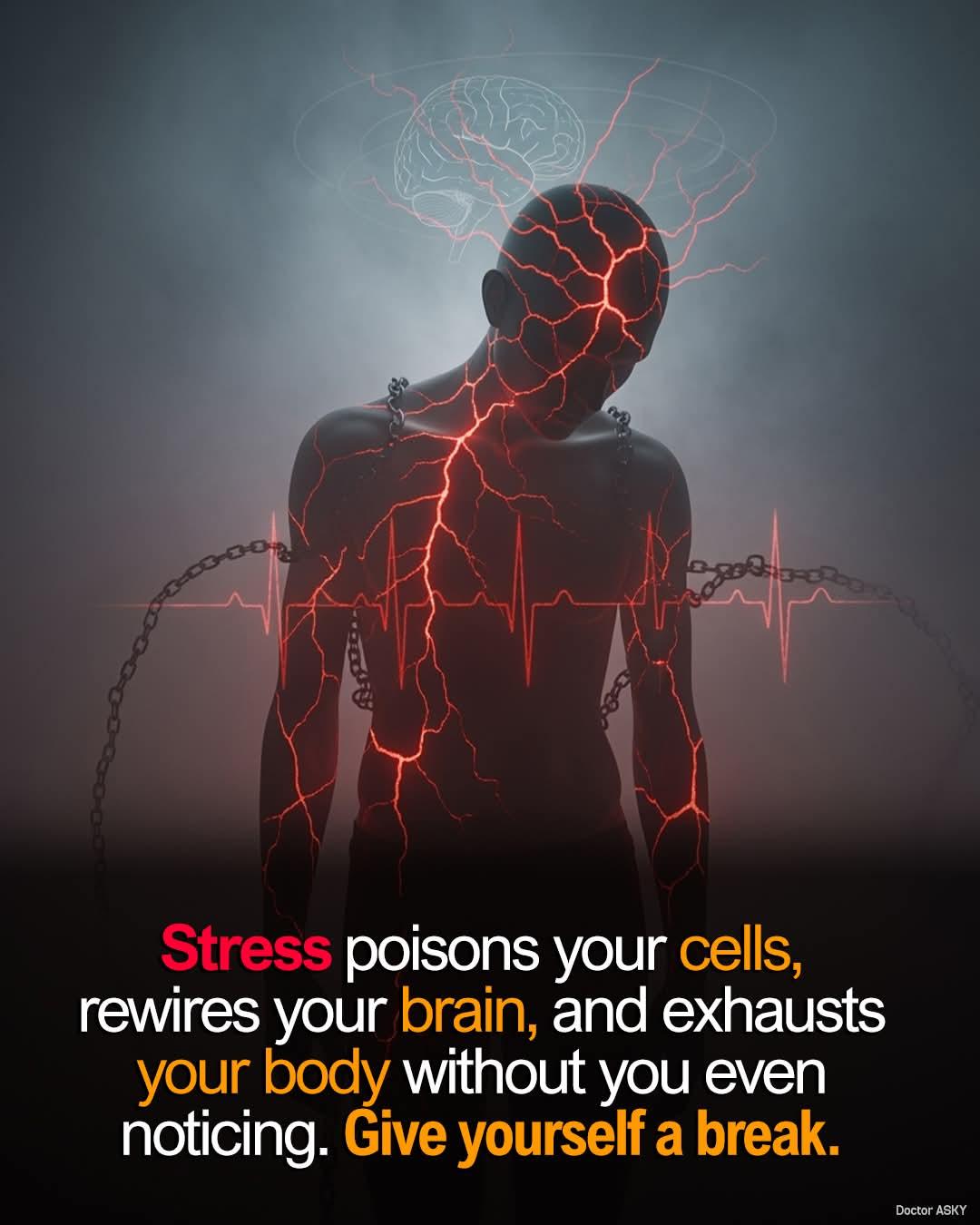Stress, anxiety, overworking, and overthinking don’t just drain you mentally—they silently disrupt nearly every system in your body. Constant mental pressure floods the brain with cortisol, the main stress hormone. Over time, this shrinks the hippocampus (memory and learning) and weakens the prefrontal cortex (decision-making and emotional control). Anxiety keeps your brain stuck in survival mode, making it harder to focus, sleep, or think clearly. Mood swings, panic attacks, or emotional numbness often follow.
This pressure doesn’t stop at the brain. It reaches your heart and blood vessels, raising blood pressure and heart rate. The arteries become inflamed, increasing the risk of clots, plaque buildup, strokes, and heart disease. Over time, this can quietly erode cardiovascular health.
On a cellular level, stress shortens telomeres—the protective caps on DNA—accelerating aging. The immune system weakens, making it harder to fight illness or recover. Chronic inflammation from stress raises the risk of autoimmune issues, cancer, and other serious conditions. Free radicals multiply, damaging cells and organs over time.
Your gut suffers too. Stress disrupts digestion, causing cramps, bloating, or irregular bowel movements. It can damage the gut lining, triggering leaky gut, inflammation, and food sensitivities. Appetite swings between cravings and total loss can lead to fatigue and nutrient imbalances.
Hormones fall out of balance. Sleep becomes difficult, and stress affects thyroid, reproductive, and insulin levels. This can lead to weight gain, fatigue, acne, missed periods, low libido, or even diabetes. Muscles stay tense, bones weaken, and skin may dull or break out due to cortisol’s effects.
Left unchecked, this leads to burnout—emotional, mental, and physical collapse. The risk of Alzheimer’s, heart disease, and chronic illnesses grows. Brain function slows, emotions numb, and life begins to feel like survival.
But healing is possible. Your well-being matters more than your to-do list. You are precious. Please take a moment to breathe, rest, and care for yourself. Nothing is more important than you. ❤
This pressure doesn’t stop at the brain. It reaches your heart and blood vessels, raising blood pressure and heart rate. The arteries become inflamed, increasing the risk of clots, plaque buildup, strokes, and heart disease. Over time, this can quietly erode cardiovascular health.
On a cellular level, stress shortens telomeres—the protective caps on DNA—accelerating aging. The immune system weakens, making it harder to fight illness or recover. Chronic inflammation from stress raises the risk of autoimmune issues, cancer, and other serious conditions. Free radicals multiply, damaging cells and organs over time.
Your gut suffers too. Stress disrupts digestion, causing cramps, bloating, or irregular bowel movements. It can damage the gut lining, triggering leaky gut, inflammation, and food sensitivities. Appetite swings between cravings and total loss can lead to fatigue and nutrient imbalances.
Hormones fall out of balance. Sleep becomes difficult, and stress affects thyroid, reproductive, and insulin levels. This can lead to weight gain, fatigue, acne, missed periods, low libido, or even diabetes. Muscles stay tense, bones weaken, and skin may dull or break out due to cortisol’s effects.
Left unchecked, this leads to burnout—emotional, mental, and physical collapse. The risk of Alzheimer’s, heart disease, and chronic illnesses grows. Brain function slows, emotions numb, and life begins to feel like survival.
But healing is possible. Your well-being matters more than your to-do list. You are precious. Please take a moment to breathe, rest, and care for yourself. Nothing is more important than you. ❤
Stress, anxiety, overworking, and overthinking don’t just drain you mentally—they silently disrupt nearly every system in your body. Constant mental pressure floods the brain with cortisol, the main stress hormone. Over time, this shrinks the hippocampus (memory and learning) and weakens the prefrontal cortex (decision-making and emotional control). Anxiety keeps your brain stuck in survival mode, making it harder to focus, sleep, or think clearly. Mood swings, panic attacks, or emotional numbness often follow.
This pressure doesn’t stop at the brain. It reaches your heart and blood vessels, raising blood pressure and heart rate. The arteries become inflamed, increasing the risk of clots, plaque buildup, strokes, and heart disease. Over time, this can quietly erode cardiovascular health.
On a cellular level, stress shortens telomeres—the protective caps on DNA—accelerating aging. The immune system weakens, making it harder to fight illness or recover. Chronic inflammation from stress raises the risk of autoimmune issues, cancer, and other serious conditions. Free radicals multiply, damaging cells and organs over time.
Your gut suffers too. Stress disrupts digestion, causing cramps, bloating, or irregular bowel movements. It can damage the gut lining, triggering leaky gut, inflammation, and food sensitivities. Appetite swings between cravings and total loss can lead to fatigue and nutrient imbalances.
Hormones fall out of balance. Sleep becomes difficult, and stress affects thyroid, reproductive, and insulin levels. This can lead to weight gain, fatigue, acne, missed periods, low libido, or even diabetes. Muscles stay tense, bones weaken, and skin may dull or break out due to cortisol’s effects.
Left unchecked, this leads to burnout—emotional, mental, and physical collapse. The risk of Alzheimer’s, heart disease, and chronic illnesses grows. Brain function slows, emotions numb, and life begins to feel like survival.
But healing is possible. Your well-being matters more than your to-do list. You are precious. Please take a moment to breathe, rest, and care for yourself. Nothing is more important than you. ❤
0 Comments
0 Shares
468 Views



